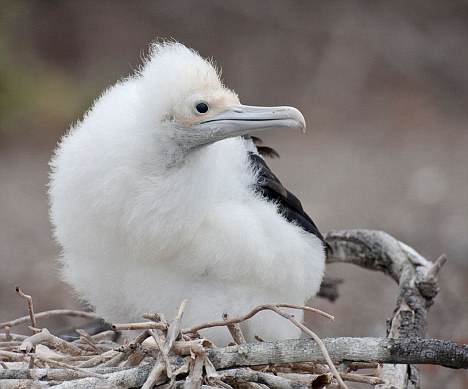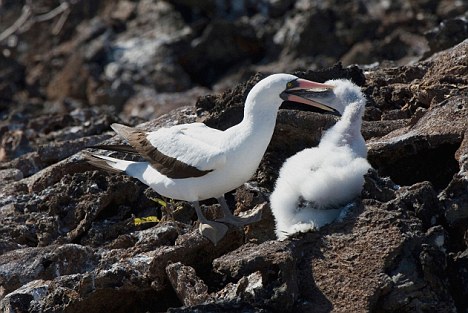科学家声称,幼鸟受到成年鸟的虐待和欺负后,成年后它们也会同样对幼鸟施虐。

纳斯卡鲣鸟幼雏
纳斯卡鲣鸟是Galapogas群岛上的海鸟,群体研究发现这一鸟类遵循“暴力循环”,这一点在某些情况下与人类的极为相似。
这种鸟成年后经常虐待幼鸟,行为科学家发现这一行为代代相传。
它们称这是首个来自野生动物的证据,表明虐待幼仔是群体行为而非遗传作用。
相关的研究发表在The Auk 期刊上,成鸟虐待雏鸟很常见,几乎所有雏鸟都受到虐待。

成年纳斯卡鲣鸟喂食幼雏
暴力效应的循环以多种形式存在脊椎动物的社会行为中,研究人员在半自然条件下人类、自然条件下纳斯卡鲣鸟和人工圈养下一些哺乳动物中都发现了“暴力循环”。纳斯卡鲣鸟模型对这一现象的研究很有用,尽管还不能应用到人类中。
鸟巢靠的很近时,2个鸟家庭之间就会爆发暴力行为。上代鸟外出觅食时,没有血缘关系的成年鸟飞向幼雏,承担照顾和喂养职责,或者在性和身体上施虐。

Galapogas群岛
科学家称,他们证实暴力行为不是遗传所致而是鸟类社会的影响。(生物探索译 Pobee)
生物探索推荐英文原文
Cycle of violence: Chicks abused by older birds are more likely to grow up to become bullies
Chicks bullied and abused by older birds are more likely to do the same when they become adults, scientists have claimed.
A study of a colony of Nazca Boobies, a seabird from the Galapogas Islands, discovered they follow a 'cycle of violence' similar to that sometimes found in humans.
Older birds in this species often mistreat younger ones, behaviour scientists found was generally repeated through the generations.
They claim it is the first evidence from the wild showing that, as with humans, child abuse is socially transmitted rather than genetic.
The study has been published in the journal The Auk, by Martina Müller, Dr David Anderson and other academics from Wake Forest University, in North Carolina.
The maltreatment of nestlings by adults is really obvious,' Dr Anderson told BBC Nature. 'Essentially all nestlings experience some maltreatment.'
'The cycle of violence effect may be a widespread cause of variation in the social behaviour of vertebrates, having been identified in humans in semi-natural conditions, Nazca Boobies in natural conditions, and several mammals in artificial captive conditions.
The Nazca booby model may be very useful for studies of the phenomenon, especially manipulative studies, that cannot be done with humans.'
Just like humans, Nazca parents will generally raise one child at a time and some have an abusive relationship.
Also as these birds tend to nest very close together, violence will break out between families.
Often, when parent birds are away from the nest gathering food, non-related adults will start to interact with the babies.
This can take the form of care and feeding or in some cases sexual and physical abuse.
Scientists watched the birds, ringing them for identification purposes, for three consecutive breeding cycles.
As a result the scientists say they have proved their behaviour is not genetic but instead influenced by the birds' own society.







